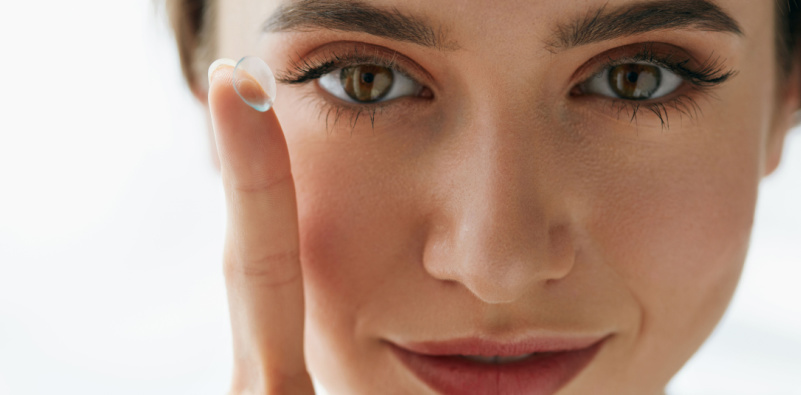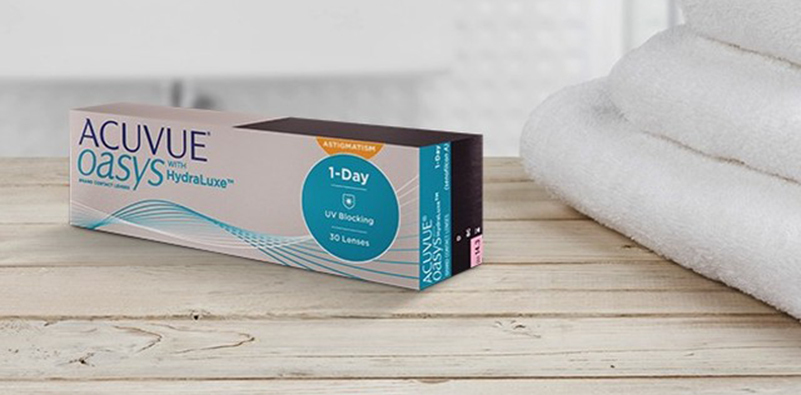A Beginners Guide to Contact Lenses

Are you considering making the switch from glasses to contact lenses? It’s a big decision that can make a huge difference in your everyday life, allowing you to get back to enjoying activities and feeling more confident in your appearance. But it can be an intimidating process to consider for some.
The good news is that understanding what’s involved with contact lens wear – from taking care of them and keeping them clean to choosing the right type for your eyes – doesn’t have to be complicated!
We’ll break down everything you need to know about switching from glasses to contact lenses so that you feel prepared and confident when you decide to try them.
Why Choose Contact Lenses?

Contact lenses offer clear vision and a panoramic field of view compared to glasses, providing a more natural visual experience. They’re perfect for active lifestyles, whether you’re an athlete, enjoy outdoor activities, or simply want the freedom to move without the hassle of glasses.
Contact lenses stay securely in place directly on your eye, allowing you to comfortably engage in sports or other physical activities. They are virtually unnoticeable and ensure maximum comfort throughout the day. Unlike glasses, contact lenses don’t fog up, making them ideal for those in humid or cold climates.
Contact lenses also allow you to have a more natural appearance.
Types of Contact Lenses

Photo credit: Acuvue UK
When it comes to finding the perfect contact lenses in Whitley Bay, there are several options available to suit your needs. Let’s take a closer look:
1. Daily disposable contact lenses: These are designed for single use, making them incredibly convenient. Say goodbye to cleaning and storing – simply discard them at the end of the day and insert a fresh pair the next morning. From a hygiene perspective, this also means you’ll be less prone to developing irritation and potential eye infections. These are great for people who want to alternate between glasses and contact lenses and may only opt to wear them for special occasions, or activities like sports.
2. Two-weekly and monthly contact lenses: These are worn for 2 weeks or a month at a time, and then replace with a new pair to last for the same period. They’re available in a wide range of materials and designs, compared to daily disposables, which means some, for example, might be slightly thicker and retain more moisture, making them more suitable for dry eye sufferers. While they require regular cleaning and disinfection, they offer cost-effectiveness and are perfect for environmentally conscious individuals looking to minimise waste.
3. Specialised lenses: These are designed for special vision correction needs, such as presbyopia or astigmatism. Whether you need multifocal contact lenses or lenses to correct astigmatism, there are plenty of options to provide clear and comfortable vision, whatever your prescription.
As an independent practice, we have access to a wide variety of contact lenses from major brands, giving us the freedom to find the most suitable type for your individual lifestyle and vision needs.
Alternating between contact lenses and glasses
Although contact lenses can be worn throughout the day, there are a few occasions where changing between contact lenses and glasses may be necessary. Unless you’re wearing specialist overnight contact lenses, sleeping with your lenses in is a no-go. Keep a pair of glasses handy for those late nights and early mornings when you don’t have your lenses in and may need to get up to go to the bathroom or get a glass of water.
Contact lenses and water do not mix. It’s important to remember to remove your contact lenses before showering and partaking in activities such as swimming and hot tubs. Water contains bacteria that can enter through scratches or minor cuts in the eye and cause nasty infections. If you wear reusable lenses you should also never clean them or your contact lens case with water either for the same reason – always use the recommended saline solution.
You may also need to swap back to your glasses if you suffer from allergies such as hay fever. Pollen can become trapped underneath the contact lenses, making your eyes even more itchy and swollen. If this persists and eye drops don’t help, taking a break by wearing glasses may be the best solution until it dies down.
Making The Switch To Contact Lenses

If you’re considering switching to contact lenses, it’s important to consult a qualified optometrist. At Robinson Optometrists, your trusted opticians in Monkseaton, we offer a free tolerance contact lens trial following an eye examination and contact lens fitting consultation and teaching session. This allows you to experience wearing contact lenses for a week once you’re confident with inserting and removing them, helping you decide whether they are right for you. We don’t charge a fitting or annual fee, as all future contact lens aftercare appointments are covered by a monthly fee, ensuring your ongoing eye health is taken care of.
Ready to make the switch? Contact us today to schedule an appointment and enquire about our contact lens services and get ready to experience the freedom, comfort, and clear vision that contact lenses can provide!
